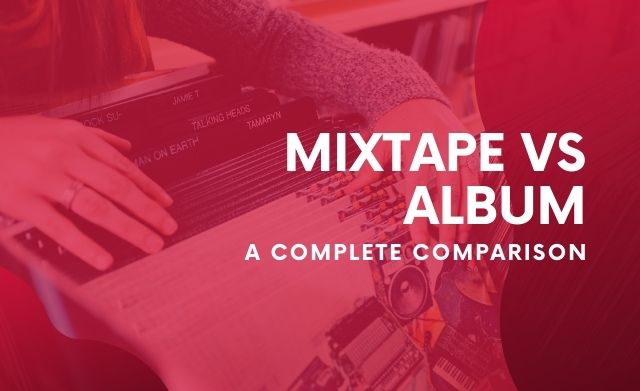
We generally call every kind of music record an album, but not all are considered the same. The difference between a mixtape and an album is in the type of recording mediums they are. From the inception, recorded music has been shifting from one form to another, and this evolution process is still moving forward. From wax cylinders to the current era of digital formats, it has never stopped the journey. Meanwhile, a bunch of recording formats were invented and disappeared over time.
For many, singles, mixtapes, albums, EPs, LPs terms like these and how they differ from each other doesn’t matter at all; they just listen to whatever they get. But if you are a newbie artist or a person who loves to dive deep into music, these recording formats and what they are might matter a lot.
The term mixtape has been wandering around the music world since the 1970s and gained popularity right after it came into existence. Mixtapes first appeared in New York when several Hip Hop artists introduced this to the audience.
As far as mixtapes and albums are concerned, there are some significant differences between them. Generally, mixtapes are distributed for free, and they are created for promotions or as a showcase of skills. But, albums are not free. They are market-oriented and are made for commercial purposes. The formats and the features used in these two mediums are different, and they differ almost in every area, from the number of tracks to the process of creation.
Mixtapes are typically homemade mixtures of audio tracks taken from different sources and recorded on cassettes, CDs, digital, or other mediums and are not meant for selling. On the other hand, an Album is a collection of several original (or cover) tracks recorded on CDs, cassettes, digital, or other formats that are composed and produced professionally by production companies to sell on the market.
Table of Contents
Comparison chart
| Difference | Mixtape | Album |
| Definition | Homemade compilation of audio tracks recorded on cassettes, CDs, Digital, or other mediums | Number of original or covered tracks recorded on cassettes, CDs, Digital, or other mediums |
| Commercial value | mainly Free | Not free |
| Recording platform | home or in individual platforms | Usually in studios |
| Production | Self-produced or independently released | Released under record labels |
| Record contracts | Doesn’t required | Required |
| Number of tracks | Compilation of full and short length music tracks, sometimes more than 50 songs | Typically more than seven tracks |
| Theme | No particular theme | In general, it follows a specific theme |
| Copyright | Not copyrighted | Copyrighted |
| Created genre | Generally DJ, Rap, Hip Hop and R&B | All kinds of genres |
| Purpose | For DJ clubs, showing artist’s skills, for promotion, to create a fanbase or given as gifts. | Recognition, fame, money |
What is a mixtape?
So what qualifies as a mixtape, and what’s the purpose of creating such formats?
A large part of those answers lies in the term itself, Mixtape (or Mix-tape). Tapes or audio cassettes had ruled the music world until CDs replaced them. So the word Tape indicates since the beginning, mixtapes were addressed to its audiences in cassette formats. The other term, Mix, defines a compilation of music.
For many individuals, it doesn’t become possible to attach themselves to production houses. It needs good bucks and set up to produce professionally made albums. That’s one of the main reasons for creating Mixtapes. Mixtapes are generally homemade records by individuals, and the music used is not as professionally designed or planned as those are in albums. They are taken from many sources without considering the copyright factors (since mixtapes are not made for commercial purposes).
You may compare a mixtape with a portfolio. Artists (especially DJs and rappers) create them to show their music skills and beat-matching ability.
The artist who creates mixtapes mostly takes the music from many sources (although we are witnessing some fully original recordings lately on digital platforms) and records them onto a single medium by adding extra beats, rapping over, changing the tempo, or trimming the length.
These are also created for DJ clubs where nonstop tracks are being played for a long time. However, Mixtapes are not only designed to show the artists’ ability or meant to play in underground DJ clubs; instead, many professional artists create them for promotions of their upcoming albums.
Take Drake’s self-released 2009 mixtape So far gone as an example. This mixtape proved to be one of the catalysts for his career. Two tracks from that Mixtapes were released as singles later and gained massive success on the US record chart. So far gone was released on several digital streaming and cloud platforms for free.
Many famous artists, including rappers like Nicky Minaj, Lil Wayne, Kanye West, have released mixtapes during their career as promotional tools.
Mixtapes are also recorded for distributing among friends as gifts or for getting feedback. But, you need to understand one thing, as long as your mixtapes are recorded onto an analog medium for non-commercial purposes, you don’t need to worry about the copyright factors. But for digital platforms, creating mixtapes by copyrighted materials from other sources for commercial purposes and sharing them are considered entirely illegal.
Unlike most albums, Mixtapes doesn’t usually follow a particular theme. They generally contain random Hip hop, R&B, or mixed tracks and are played one after one non-stop on a variety of beats.
What is an album?
Albums, a known term for every music lover, is a collection of audio tracks available in vinyl, cassettes, CDs, digital, or other mediums. Mainly they are recorded in studios and released for commercial purposes.
Unlike mixtapes, a music album is designed in a more planned way and more often follows a particular theme. The tracks are original (or maybe covered) and copyrighted. The entire process (from writing to recording) may take up to a year or more.
An album requires a recording deal (also known as a recording contract) between the artist and the record label. It is a legal process where the artist agrees to record songs for the recording label.
A record that has not more than 6 songs is known as an EP. So, an album contains at least 7 pieces and may take up to many. Yet, on average, an album has 7-12 songs and runs for 30 minutes to an hour. The time frame is not limited to any standard.
There is usually a 3-4 seconds pause between two tracks, and the transition follows a smooth process, which we don’t see in a mixtape. The songs in a mixtape are played comparatively in a rushing way.
The reasons for an artist to create an album are to gain recognition, reach works to many, gain popularity and make money. In the history of music, we have seen many artists gaining popularity overnight by releasing an album. On the other side of the coin, we have also witnessed many encountering the end of their careers.
The key differences between a mixtape and an album
- Mixtapes are a homemade compilation of music collected from multiple sources and recorded on cassettes, CDs, digitals, and other mediums. On the other hand, Albums are a collection of original (or covered) music recorded on cassettes, CDs, Digital, and other mediums.
- Mixtapes are not created for commercial purposes. Conversely, Albums are produced for commercial purposes.
- Mixtapes are homemade or self-produced, while albums are recorded in studios and released under record labels.
- Artists create Mixtapes for showing skills, promotional purposes, gifts, or DJ clubs, while albums are recorded for recognition, fame, sharing work with others, and making money.
- Mixtapes are created in a short time and don’t require any long preparation. An album needs massive preparation like writing a song, composing, recording, etc., and sometimes it takes more than a year to complete.
- Albums usually have a specific theme. Mixtapes don’t need to have a particular theme.
- It is illegal to sell mixtapes as they usually don’t take copyright laws into account. Contrarily, albums are legally permitted for selling.
- Individuals randomly create mixtapes. Hence, there are no limitations on the number of music or lengths. However, some mixtapes have more than 50 tracks. When it comes to albums, they usually have a minimum of 7 tracks.
EP and LP
We have discussed Mixtape vs. Album thoroughly in this article, yet other recording formats are also popular among many music lovers. EP and LP are two of them. EP stands for Extended play, a music recording format that usually has more tracks than a single but fewer tracks compared to albums and LPs. An EP can have 2-6 songs, and the maximum length of an EP can be up to 30 min.
Conversely, LP stands for Long play, is basically a full-length vinyl record that is longer than EPs. LPs are characteristically the same as traditional albums; that’s why they are mentioned as LP albums. LPs always maintain an ideal album length.
EP and LP differ from each other based on the number of tracks and lengths. Unlike mixtapes, EPs and LPs are made for commercial purposes and are sold on the music market (including digital platforms).
Frequently asked questions (FAQs):
Why are mixtapes illegal?
It is illegal to sell mixtapes because the materials used in them are taken from original copyrighted sources. But one can record mixtapes to show their skills to others, and it’s okay unless they opt for commercial purposes.
Can an EP have 7 songs?
Extended-play or EPs don’t have more than six songs. A record that has more than six songs is considered an Album. The maximum length of an EP is not more than 30 minutes.
What is mixtape in bts?
A K-pop singer and a rapper named RM(Kim Nam-Joon), a member of popular South Korean boy band BTS, released a mixtape on Soundcloud in March 2015. It’s his debut mixtape. However, other BTS rap line members like Suga, J-hope have also released mixtapes for free on digital platforms.
Conclusion
Mixtapes are a homemade non-commercial compilation of music pieces collected from different sources. Inversely, albums are a collection of some originally recorded tracks produced for commercial objectives. This article has thoroughly discussed the difference between a mixtape and an album from various standpoints.

Craig is a full-time academic and research-based article writer from California. A trained content creator who started his career as a column writer for local magazines and newspapers. His works have been published on many renowned online platforms.
